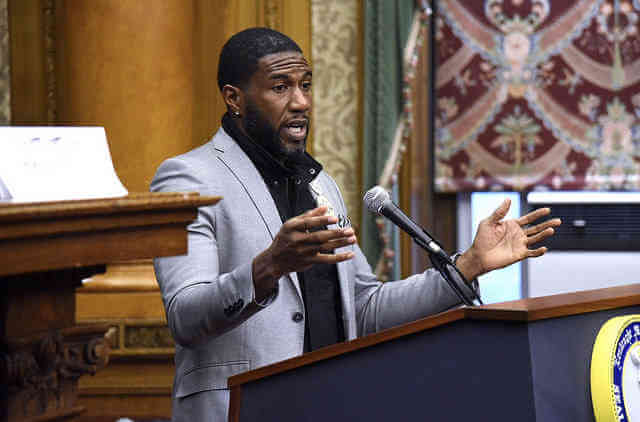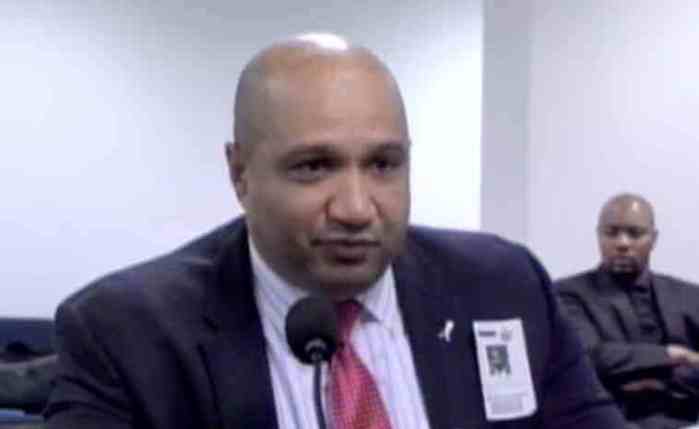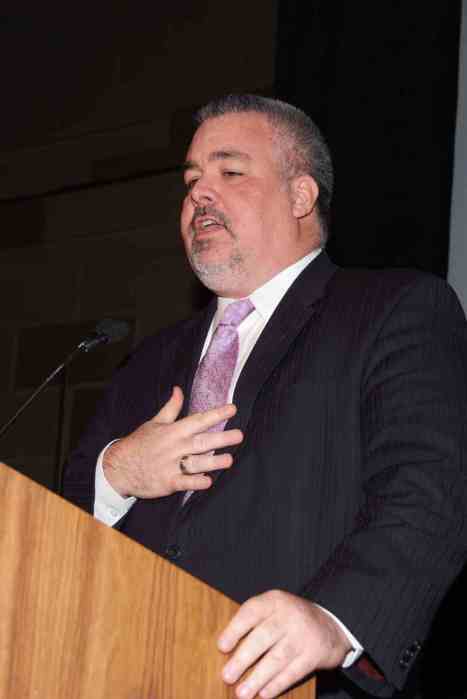City Council Speaker Melissa Mark-Viverito and Health Committee Chair Corey Johnson at a 2014 World AIDS Day event at the Apollo Theater in Harlem. | DONNA ACETO
New York City’s public health campaign against HIV infection and accidental heroin overdoses took a significant step forward last week.
Safe Injection Facilities are now officially being explored as part of the city’s push to lower the rates of HIV transmission and reduce overdose deaths. A $100,000 study to examine the science and practices involved in SIFs will be included in the City Council’s budget with the support of Speaker Melissa Mark-Viverito.
At such harm reduction facilities, a user brings drugs purchased from a dealer and is provided with sterile supplies, including needles, and given a safe place to inject. A health professional is on the premises and able to immediately intercede at the first signs of an overdose.
Speaker Mark-Viverito, Councilmember Johnson cite health benefits of “safe, clean haven”
These programs are most beneficial to drug users who are homeless or can’t inject where they live –– a population that gathers under bridges, in vacant lots, or any place that offers a modicum of privacy like stairwells. Often, they lack sterile needles and will share them. Injections under these conditions can spread HIV, hepatitis, and other infectious diseases.
Mark-Viverito said SIFs would provide “a safe, clean haven to high-risk, vulnerable New Yorkers.”
Many users among this vulnerable population also deal with mental health issues, so safe injection facilities can serve as a bridge between the public health community and the user population. While common in Europe and Australia, with a limited number in Canada, as well, SIFs have not yet emerged in the US.
The city’s prospective embrace of SIFs won strong support from Gay Men’s Health Crisis, which in a written release termed the approach “a smart, effective health care policy that has been proven to work.” Kelsey Louie, the agency’s CEO, said in the statement, “For too long, local governments have rejected supervised injection facilities because of our collective discomfort with the painful challenges of drug addiction.”
Equally enthusiastic is VOCAL-NY, a grass-root group that advocates for housing as well as drug law and criminal justice reform. The group described SIFs as “incredibly important,” but Matt Curtis, its policy director, warned against business as usual.
“We just can’t wait,” he said. “People are dying every day.”
Politico broke the news on September 28, quoting Mark-Viverito and featuring a photo of Corey Johnson, the out gay Chelsea city councilmember who chairs the Health Committee. Johnson has long been a supporter of the concept and is exploring what legal framework would need to be in place to implement SIFs in the city.
The proposed Council study will examine available epidemiological data on SIFs and consider whether they should be rolled out in a stand-alone program or integrated into other health programs. The feasibility of employing a mobile facility to house a SIF will also be explored. The study will gather input from city health officials as well as from experts on those communities affected by heroin use.
Groups running needle exchange programs in New York have been eager to start SIFs, often voicing impatience as they waited for official action while the number of overdose deaths has grown markedly. Political backlash, however, is widely expected, with some critics likely to characterize SIFs as government-run and -funded shooting galleries. That kind of attack may have lost its sting with a greater awareness of harm reduction as a public health strategy. Still, it’s unclear at this point whether the city’s support for SIFs could survive a major controversy along those lines.
Not surprisingly, with the Council only committing to study the issue, the city’s Department of Health and Mental Hygiene is publicly reserving judging, saying, “There are no plans for implementing a SIF in New York City at this time.”
The Council’s announcement follows a major heroin bust –– led by State Attorney General Eric Schneiderman –– in which state police seized 33 kilograms of the contraband from a nationwide drug gang alleged to have brought it in from Mexico and then cut it with fentanyl, a potent painkiller often implicated in drug overdoses, roach killer, and other products dangerous to the health of users. At a news conference, Schneiderman railed against the gang’s “callousness” and made clear that adulterating heroin is this manner would bring longer prison sentences.
In other developments in the city’s fight against HIV, Dr. Demetre Daskalakis, the health department’s assistant commissioner for the Bureau of HIV/ AIDS, has endorsed a consensus statement saying health professionals and activists agree that HIV-positive people with “consistently undetectable viral load for six months and beyond” pose a negligible risk for transmitting the virus. In other words, someone who is poz and sticking to their regimen of meds is not passing the infection on to others.
The emerging public understanding of that science could help overturn laws around the nation that impose criminal penalties on positive people for having sex under certain circumstances.
Recent surveillance data about New York City shows continued improvement in viral suppression among those who are HIV-positive, with 72 percent of that population estimated to have undetectable viral loads. The push to get HIV-positive people into treatment has been accompanied by public health campaigns to get at-risk negative people into pre-exposure prophylaxis, or PrEP, treatment to prevent their becoming infected.
Walk Right in at GMHC:
Gay Men’s Health Crisis is offering free testing for hepatitis C, by appointment or via simple walk-in service. Testing, carried out in Chelsea at the David Geffen Center for HIV Prevention and Health Education on the ground floor at 224 West 29th Street, is also available for HIV and other STDs.
GMHC can help clients get health insurance and, if they are HIV-negative, go on PrEP to prevent infection.
The testing center is open Mondays, Tuesdays, and Fridays, 9 a.m.-6:30 p.m. (12:30-3:30 p.m. on the second Friday of each month); Wednesdays, 9 a.m.-12:30 p.m. and 2:30-6:30 p.m.; and Saturdays, 9 a.m.-1:30 p.m. On Thursdays, testing is by appointment only at 212-367-1100.
According to the agency, its “new rapid-testing program promotes early and effortless detection.” Anyone who tests positive for HIV is offered an immediate walk over to the Mt. Sinai medical services facility at 309 West 23rd Street or at 325 West 15th Street.
GMHC boasts that 90 percent of its positive population has successfully suppressed the virus, keeping them healthy and essentially eliminating the risk they could pose an infection risk to others.


































